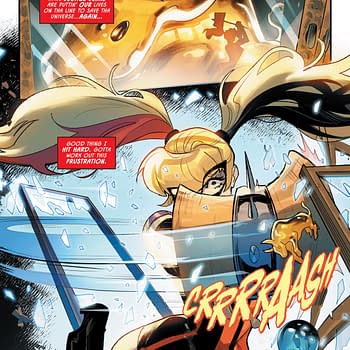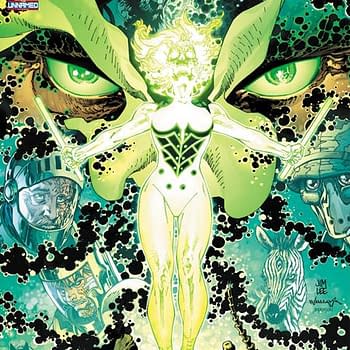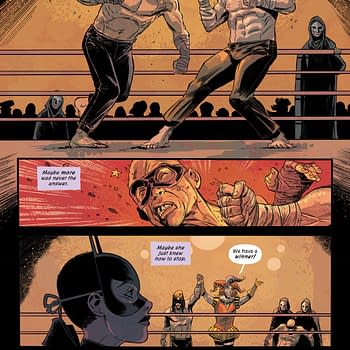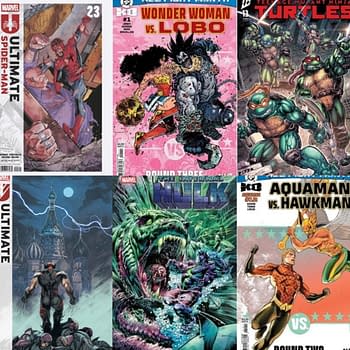Posted in: Comics, Recent Updates | Tagged: Comics, entertainment, image comics, jock, Matt Hollingsworth, scott snyder, Wytches #3
Advance Look At Scott Snyder's Essay In Wytches #3 – 'Get Rid Of Your Weakness. Get Rid Of Your Fear. Kill Your Love.'
Wytches,from Image Comics, has been one of my favorite books of 2014, and I'm not alone. It is a darkly intriguing book, a very human one, and the artwork by Jock with Matt Hollingsworth's colors is a combination of the nightmarish, hyper-real and psychedelic that needs its own term not yet invented. It's therefore a very good week to be a Wytches fan with #3 arriving on Wednesday, December 17th. Scott Snyder has continued in his backmatter contributions to the series with a rather terrifying and meaningful essay about children, fear, and the difference between the permissive role we play in our fears and the realities of the world we can't quite shut out.

Not long ago, my 7-year-old son lost a tooth. It was his second tooth to go and I was a little apprehensive about what his reaction would be; with his first tooth to fall out, he'd suffered some real fears about the tooth fairy. He'd always had nightmares, been the type of kid to come into the room in the middle of the night and ask to sleep in our room or have me sleep in his (to be fair, I try to keep my office free of faceless clowns and vampires as possible, but still…). Anyway, he was a nervous kid, and he had not been cool with this idea that she was going to climb in his window and over his bed. "Wait, so she breaks into my room, like home invasion?" he'd asked me. I'd tried to explain it was less nefarious than that, but still, he'd been unnerved. I could see his little brain working as he held the tiny tooth in his hand: conjuring images of this spindly creature climbing over his face with its dirty feet, a bag of bloody teeth in its hand…
But this time he seemed more relaxed, more confident. I asked him if he was excited for the tooth fairy to come and bring him money. "Yeah," he said, wrapping the tooth in paper. "She only has power if you believe in her anyway. And I only believe in her part way."
I cannot tell you how great I found this answer. So he believed in her enough to get the money, but not enough for her to be powerful enough to scare him. I remember telling my wife about his comments later that night, after he was asleep. And I remember how strange it was to think that he was passing out of a phase of these kid fears. Soon there'd be no more worries about monsters in the closet or under the bed. No more questions about "ghosties" in the garage. I was relieved all of sudden. Maybe this was the end of the nightmare phase. He was becoming a little man.
Anyway, he got his few dollars for his tooth and we spent it at the comic store and all was good. And then, about a week later, I got a call from Jack's teacher while he was at school. Apparently, the school had something called a lockdown drill that day. (When I'd first heard about these drills I wasn't sure what they were—fire drills? I remember asking the mother of a friend of Jack's one morning and her grimacing and explaining in a whispered tone: "school shooter drills."
(I know.)
Anyway, Jack's teacher explained to me that, unfortunately, he'd been outside the classroom when the drill had happened. He'd been getting a drink of water and the alarm had gone off and he'd been out there, in the hallway, alone. To be fair, his teacher was great about it, sympathetic and apologetic, nurturing.
But when he got home that day, Jack was clearly rattled by the experience. Tight lipped. Quick to start. I took him to the comic store; we got treats. But it'd shaken him. And that night, before bed, he asked me if he could take a thermos to school from then on so he wouldn't have to leave the classroom for water. I told him sure. But that it was just a mistake and he shouldn't worry. There was nothing to be afraid of. It was just a loud bell. "But there are shooters, aren't there?" he said. "Like school invasion?"
…
What could I say, except yes, there were. And suddenly I wished I could go back to the kid fears. The tooth fairies and monsters. Because these NEW fears—fears concerning the evil that people do to one another—they are justified and potent and terrifying. And worse than this, there is no protecting your child from them. From the dirty, black-footed tooth fairy, sure. But from a gunman… And this helplessness engenders its own evil feelings; I worry about my children and I can't protect them. I wish I could stop worrying. I want a moment's peace. And so on. It's like your child has just entered this realm of human monsters and you're one, too.
The truth is, this is largely what Wytches is about. The Wytches are monsters, but they're monsters that only act when we give them permission to. When we go to them and pledge each other, then they come with their teeth bared. And their favorite things to eat are children. Get rid of your weakness. Get rid of your fear. Kill your love.
Yes, it has a high concept, sure. "Wytches: forget everything you thought you knew about them." But ultimately, it's a book about the terrifying parts of ourselves we don't like looking at. The funhouse mirror parts. The ugly parts, and how those ugly parts lie just beneath the skin.















